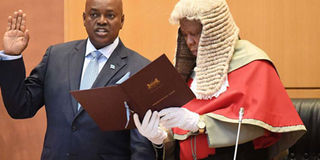Demise of Winnie Mandela and the rise of ‘the machines’

Botswana's newly elected President Mokgweetsi Masisi (left) takes the oath administered by Chief Justice Maruping Dibotelo at the National Assembly in Gaborone on April 1, 2018. PHOTO | MONIRUL BHUIYAN | AFP
What you need to know:
- Generally, young leaders in Africa have come to power as guerrilla leaders or succeeded their fathers who were military dictator or monarchs.
- Clearly, although we have the older generation clinging on in a few places, that pool from which they originated is fast drying up.
South African anti-apartheid activist and politician Winnie Madikizela-Mandela, who was an ex-wife of Nelson Mandela, died on Monday at 81.
In the outpouring of emotion that followed, however, a significant fact was not properly reckoned with.
Madikizela-Mandela’s passing was another page closed the “historical” anti-apartheid heroes.
It has been under way over the past 25 years, beginning, perhaps, with the death of Walter Sisulu in 1993.
BOTSWANA
Indeed, President Cyril Ramaphosa, who took over after the scandalous Jacob Zuma was voted out by the ruling African National Congress (ANC) in February, though an anti-apartheid activist, was not a frontline politician like Madikizela-Mandela, former president Thabo Mbeki, Zuma or Mandela.
He was a powerful trade union leader.
This transition has been eventful all over the continent. This year so far, it’s not only Ramaphosa who has become president.
On Saturday, Ian Khama, the president of that almost annoyingly rich, non-corrupt, and nearly-always democratic Botswana, stepped down 18 months ahead of the election.
Africa’s strongmen must be wondering what strange food he ate, and they can’t blame his wife this time because he is a bachelor.
PAUL BIYA
His vice-president, 55-year-old Mokgweetsi Masisi, was sworn in as president.
At 65, Khama is not biologically a young man, but a toddler in old school African politics.
Consider, for example, Cameroon’s dictator President Paul Biya, who has been president of the country for 35 years — first from 1979 to 1992, having been prime minister since 1975, and then on a comeback in 1997.
Officially, Biya is 85. When he first took power, Ian Khama’s father, Sir Seretse Khama, was still president and Botswana had only been independent for 13 years.
The younger Khama was just turning 26. Two presidents before him, and now he, too, having served two terms, Biya is still in charge.
ETHIOPIA
Two days after Masisi took over, in Addis Ababa, Abiy Ahmed was sworn in as Ethiopia’s new prime minister following the unprecedented resignation of Hailemariam Desalegn. Abiy is 41.
And, in what might be a fruitful break for Ethiopia, the first from the long-oppressed but majority Oromo community.
Mark you, when Desalegn took over in 2012 after the death of Meles Zenawi, he was 46.
Generally, young leaders in Africa have come to power as guerrilla leaders or succeeded their fathers who were military dictator or monarchs.
Until Abiy, DR Congo’s Joseph Kabila was Africa’s youngest incumbent leader at 46.
When he took power in 2001 after the assassination of his guerrilla leader father Laurent Desiré Kabila, he was only 29.
NKURUNZIZA
Swaziland’s King Mswati III is 49 and has been monarch for donkey’s years, having taken over from his father as a baby prince.
King Letsie III of neighbouring Lesotho is 54, having succeeded his father, Moshoeshoe II, when the latter was forced into exile in 1990.
Togo’s Faure Gnassingbé is 50. He took over from his father Gnassingbé Eyadema, the fearsome dictator who tormented the country for 39 years before he died in 2005.
Pierre Nkurunziza, who came to power in Burundi in 2005 as a guerrilla chief, is 54.
Now that he is determined to be president for life, should he emulate Biya he could be around in 2050 and beyond.
YOUNG LEADERS
Therefore, if we discount the Independence period, when many young nationalists became presidents of their countries, in 2013 President Uhuru Kenyatta became one of the youngest leaders on the continent through a democratic election, at 52.
He was only beaten by Senegal’s Macky Sall, who had been elected a year earlier at 51.
Clearly, although we have the older generation clinging on in a few places, that pool from which they originated is fast drying up.
And it’s not really so much about age as how it changes governance sensibilities.
Although we are seeing younger leaders, they are more boring and less colourful than the old guys.
CHARACTERISTICS
Even in Tanzania, where President John Magufuli, 58, succeeded a relatively young Jakaya Kikwete, he doesn’t have the latter’s brightness and tracksuit-and-sports-loving ways.
Desalegn was dour compared to Meles, and Abiy has been described in equally machine-like terms as “an effective orator and reformer”.
In similar tone, a South African newspaper described Masisi as “earnest, highly educated, elitist and remote”.
After many fits and starts, Africa might, finally, have entered the age of the ‘technocratic leaders’, who were much beloved by the late Calestous Juma.
We suspect African television and photographers will miss the polygamy drama and traditional dance in bare torso and leopard skin of the Zumas.
Mr Onyango-Obbo is publisher of Africapedia.com and explainer site Roguechiefs.com. Twitter: @cobbo3





